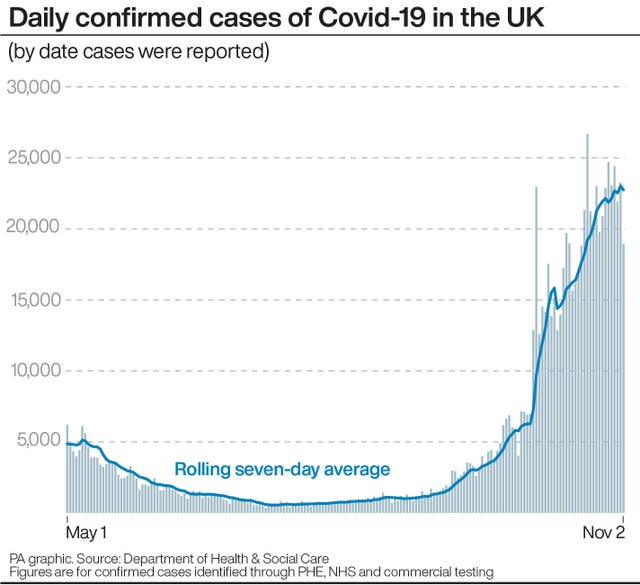Johnson predicts ‘light ahead’ after coronavirus gloom of November
The Prime Minister attempted to instil some hope ahead of England’s second lockdown.

Boris Johnson promised there are “better days before us” in the battle against coronavirus, as England prepared for a second lockdown.
The trial of rapid coronavirus tests across Liverpool and the development of new treatments offered hope, the Prime Minister told his Cabinet.
There is unease on the Tory benches about the lockdown, which will begin on Thursday and last until December 2, but Mr Johnson again insisted it was necessary.
The Prime Minister said the R number – the reproduction rate of the virus – was “only just above 1” and the lockdown would bring it back below that threshold.
He acknowledged that “we don’t want to be doing things to repress liberty, we don’t want to do anything to damage our economy” but “we would see fatalities running in the thousands if nothing was done”.
However, the rapid tests could be “possibly decisive” in defeating the virus and there were also better drugs and the prospect of a vaccine.
“Amid the uncertain gloom of November, I see light ahead and I’m absolutely certain that we will have better days before us,” he told ministers.
“Let’s all work flat-out as a Government to repay the confidence of the people who are doing the right thing and following the latest autumn measures.”
New data from the MRC Biostatistics Unit at the University of Cambridge puts the R number above 1 in most regions and the group estimates that the daily number of new infections each day across England is 77,600.
The scientists also predict the number of deaths each day is likely to be between 380 and 710 by November 14.
It comes as more information emerged on preparation work for a potential Covid-19 vaccine.
GP magazine Pulse reported that family doctors are going to be put on standby to start vaccinating over-85s and frontline workers from early December with any potential vaccine.
Mr Johnson’s efforts to win public support were not helped by two Cabinet ministers appearing confused over the restrictions which will come in on Thursday.
Communities Secretary Robert Jenrick suggested that an entire household could meet up with a friend, before then contradicting himself.
And Chancellor of the Duchy of Lancaster Michael Gove apologised after incorrectly indicating that people could play a round of golf or game of tennis with a friend.
The official guidance states that people in England can exercise or visit outdoor public places either with their household or one person from another household – although children under school-age with a parent will not count towards the limit on two people meeting outside.
On BBC Breakfast, Mr Jenrick was asked if a family could go for a walk with a friend.
The minister answered: “Yes.”
However, when pressed, Mr Jenrick said: “You can go out in your own household, or with one other person.”
Mr Gove admitted his mistake after wrongly suggesting during a question and answer session with constituents that people would be able to play singles tennis or golf in pairs during the impending lockdown.
On Tuesday morning, Mr Gove said: “My apologies, I got this wrong.
“Outdoor leisure facilities including tennis courts and golf courses will be closed from Thursday.”

England’s lockdown will end on December 2, with the Government hoping to reintroduce a localised tiered system of restrictions.
Mr Johnson hopes that a mass testing campaign, using equipment which can deliver a result in a matter of minutes, could be a route out of the coronavirus crisis.
A two-week pilot scheme in Liverpool will see half a million people offered regular testing from Friday, with 2,000 military personnel helping with the logistics.
If the pilot is a success, millions of the tests could be distributed by Christmas, Mr Johnson said.
Mayor of Liverpool Joe Anderson urged residents to get tested “for our city, our NHS, our people and our economy”.
The aim is to use new rapid turnaround tests – alongside existing swab tests, and Lamp (loop-mediated isothermal amplification) technology for NHS staff – to find asymptomatic cases in order to help prevent and reduce transmission in the community.
Chief scientific adviser Sir Patrick Vallance and chief medical officer for England Professor Chris Whitty were challenged about the evidence behind the lockdown when they appeared before MPs – particularly the use of modelling scenarios which suggested there could be as many as 4,000 deaths a day.
Labour MP Graham Stringer suggested to Sir Patrick that he had “frightened a lot of people around the country”.
Sir Patrick told the Science and Technology Committee: “I think I positioned that, and if that didn’t come across then I regret that, but I positioned that as a scenario from a couple of weeks ago, based on an assumption to try and get a new reasonable worst-case scenario.”
The experts stressed the importance of six-week projections, rather than the longer-term scenarios.
The latest figures showed a total of 978 deaths registered in England and Wales in the week ending October 23 mentioned Covid-19 on the death certificate, according to the Office for National Statistics, the highest since June 12 and a 46% increase on last week’s figure.





